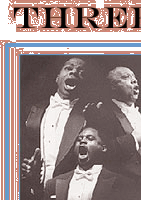 |
 |
 |
 |
 Let it echo far and wide How justice was our battleland How justice was denied Make them hear you---make them hear you In a just world, the immaculately dressed tenor would be singing operatic arias from Verdi and Puccini to his love interests -- passions which consume almost all of the repertoire of the romantic Italian composers. But he is not white. The society is not ready to hear him sing of castles to be climbed, of moats to be swum, of damsels' fair lips to be kissed. So Roderick Dixon, one of the stars in Three Mo Tenors must sing of the legacy left by rebel Coalhouse Walker in the Broadway show Ragtime to convey the adaptive genius of black tenors whose voices could not find suitable recognition on the American opera houses due to fears of promoting "race mixing." But Dixon with his two equally talented tenor brethren, Victor Trent Cook and Thomas Young, in the PBS Great Performances production airing on many U.S. cities' PBS stations in August can do it all. The next solo he performs in the concert taped live at Hammerstein Ballroom in New York is the aria Ah! Mes Amis from The Daughter of the Regiment by Donizetti. The lyrics of the song clearly indicate the dilemma black tenors, notably Roland Hayes have faced in singing unabashed love songs structured for the lyric tenor:Mes Amis means my friends. The singer emotes: " Ah, what happiness, yes my friends I shall march under your flags. Yes, she for whom I live and breathe has deigned to smile upon my vows." Black female singers including Marian Anderson in l956, followed by soprano Leontyne Price in 1961, then Shirley Verrett, Grace Bumbry, Jessye Norman and Kathleen Battle have appeared in full productions at the Metropolitan Opera acting in the roles written for a full cast as intended by the authors of opera. However, most African-American male operatic singers including Paul Robeson have adapted their talents to include a wide range of styles including gospel, spirituals, ragtime jazz, and rhythm and blues. This tradition is continued in Three Mo Tenors. The three voices converge around a medley of Duke Ellington's offerings including "Take the A Train and "It Don't Mean a Thing." Their supple harmonizing serves as prologue to equally agile rendering of rhythm and blues standards "Love Train," Betcha by Gollly Wow," and "Midnight Train to Georgia." A homage to the elegance wrought by tenor artisan Cab Calloway is rendered by Victor Trent Cook's feline grace as he sings of Minnie the Moocher; yet the somber sorrow of a people's productive lost years is amplified in the trio's heartfelt "Today I sing the Blues." The spirituals which have developed so many fine black voices are represented by standards "Were You There," and "Have You Heard About the Baby." A historical debt to Marian Anderson's historic 1939 concert at Lincoln Memorial which was scheduled after the Daughters of the American Revolution refused to allow the famed contralto to sing at constitution Hall finds payment in the group's production of "America the Beautiful." Conceived by Broadway singer, director, and producer Marion J. Caffey after he Luciano Pavarotti, Placido Domingo and Josť Carreras met onstage at the Baths of Caracalla in Rome and became the Three Tenors with a series of record-breaking concerts and records, Three Mo Tenors succeeds admirably as a solid ensemble work. A companion CD by RCA Victor is also a worthy investment. One only wishes that the production had included more classical work by black composers like Scott Joplin, William Grant Still who composed his Afro-American Symphony in 1930, and Wynton Marsalis whose Blood on the Fields garnered a Pulitzer Prize in 1997 with a post-slavery love story that hope and heralds the birth of a nation where the gentlemen Dixon, Young, and Cook will never have to be "Mo" Tenors but The Tenors. The composers of a darker hue have fought their battles well and deserve air time as often as possible too. Three Mo' Tenors in Concert will air on Thirteen/"WNET New York's Great Performances on Monday, August 4, 2001 at 8 p.m. For local listings go to WWW.pbs.org and go to the station finder search engine there for appropriate date and time in your area. [back to top] |
|